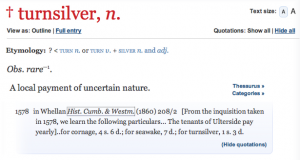{ 1 comment }
January 20, 2015University of York
I have recently completed my master’s degree for Linguistics at the University of York. I am publishing the title and modified abstract for the 15000 word dissertation I submitted in September 2012 here as a reference for fellow linguists who may be be interested in obsolete English compounds and their link to language development. For any questions regarding the dissertation, Appendix A, or historical linguistics, please email: hughes.brianne at gmail.com
=====ʃʃʃʃʃʃʃ =====
From Turncoats To Backstabbers: How Headedness and Word Order Determine the Productivity of Agentive and Instrumental Compounding in English
=====ʃʃʃʃʃʃʃ =====
Abstract: According to a study by Clark et al (1986), English-speaking children spontaneously create exocentric V+N (turncoat) compounds during the development of agentive and instrumental compounding. Historically, the turncoat pattern has low productivity in English. Appendix A (attached) is a chronological list of all of the known turncoat compounds that entered English between 1050 and 2009. Only two new words of this pattern have been created in the past fifty years: Xpel-air and Pesterchum.
Turncoat compounds are advantageous for children learning verb-object (VO) languages such as English and Spanish because the pattern mirrors the syntax. Forms which are simple and transparent in accordance to the headedness and word order of a language are productive for both children and adults. Patterns that are structurally unclear, or that conflict with syntactic features, will be abandoned.
The advantage of simplicity that turncoat compounds offer to children is outweighed by its unmarked structure and many semantic limitations. The synthetic N+V+er (backstabber) pattern, on the other hand, complies with the headedness of English, is not limited by semantic clumping or verb transitivity, and can describe neutral objects as productively as it can reductive insults. Backstabber compounds also flourish in West Germanic languages, which share right-headedness with English.
Turncoat compounds are memorable and evocative descriptors of objects and occupations, but because of their clash with the headedness of English, their productivity cannot be sustained. Turncoat compounds will never challenge backstabber compound productivity.
=====ʃʃʃʃʃʃʃ =====
{ 3 comments }
October 21, 2012LONG STORY SHORT: I was looking for citation dates for buss beggar (someone who would kiss a beggar) and buz-bloke (a pickpocket) in Teall’s 1892 book English Compound Words and Phrases, and I stumbled upon this entry:
You saw that right: buttwoman.
{ 1 comment }
August 7, 2012I’ve had turnsilver in my list of verb-noun compounds since mid-June, but I’ve never taken a close look at it until now, as I finalize my list. The OED has a very short entry about it.
The OED definition says it may be a type of ‘local payment’, but the quotation seems to suggest that it is a service rendered for which the citizens must pay some amount. I note that turnsilver is worth less than cornage and seawake.
Cornage: 4 s, 6 d
Seawake: 7 d
Turnsilver: 1 s, 3 d
{ 1 comment }
August 6, 2012 /ˈflæpdʒæk/
/ˈflæpdʒæk/
I’m trying to figure out whether flapjack is an endocentric or exocentric compound. Flap is a verb, jack is a noun, and it’s a fun compound. If I can include it in my research, I’d like to. Is a flapjack a type of jack, or a thing (not a jack) that flaps jacks?
Flap from flapjack is listed in the OED under definition 4a. It has Germanic relatives.

— Do yourself a favor and act out the definition of flap as given above. Do it now. I defy you not to giggle while you do it. Descriptive words are amazing. You really get the feeling that you’re manhandling whatever it is between your hands. Wrestle it to the ground! Flap it!
{ 2 comments }
May 25, 2012Hi there neighbor. I’m doing something about compounds in English and Spanish for my MA Linguistics dissertation, and I’m 2-weeks in, and already knee-deep in books and articles about Romance compounding, exocentric synthetic compounds in English, deverbal complex words and right-hand-headedness. It’s crazy-go-nuts.
Just today I was thinking to myself, “Brianne, you’ve really gone down the compounding rabbithole…” and I immediately responded, “RABBITHOLE! ANOTHER COMPOUND!!” And then the first Brianne shook her head.
I’m learning some really interesting things that make me say “OH!” outloud in the quiet fairhurst building, (sorry fellow students), and I’ll share them when I have a more concrete direction that will make some of this preliminary research unusable, but for now this post is just a friendly resource for me to point new acquaintances to when I ooh and aah over compounds that appear naturally in conversation. Foolproof, handbook, footprint, pickpocket, straitjacket. I’m going to do this for the next 5 months…. at least.
{ 0 comments }
April 29, 2012*This is very like the first Tiny Dissertation post in its curiosity for the answer, its short lifespan, minimal scope of interest, and un-academic treatment of the subject.
Hypothesis: There should be compound words in Spanish songs, because they are very productive in Romance languages, so they should show up in songs.
Data: Lyrics found online for 10 songs in Spanish, each by a different artist, that I listen to a lot but have never thought about in regards to compounds.
{ 0 comments }
April 26, 2012I break into song a lot, and this trait seems to manifest exponentially during my radio show. Tonight, I was talking about Becky’s 366 Days in the Life photoblog and how I’m famous because of a picture when I heard someone open the door to the radio station. I couldn’t see them at first, and so I nervously sang “I hope they don’t kill me.”
Hear the clip: Don’t Kill Me
I’ve included the full 90 second arc from mentioning Becky’s blog to joyfully wishing Ali a happy birthday. I have done this as a study in panic and the danger of death question. I’m pretty sure it’s the best moment of any of my radio shows, including the 4 years at KDUP.
Subliminal Panda DJ (still alive)
Also Happy Birthday to Finnegan from Tinker’s people!
{ 0 comments }
March 18, 20121. Broken Heart – Motion City Soundtrack
2. Break Ya Neck – Busta Rhymes
3. Heartbreaker – Pat Benatar
4. Breakdown f. Jack Johnson – Handsome Boy Modeling School
5. All Hail the Heartbreaker – The Spill Canvas
6. Blvd of Broken Songs ft. Oasis – Green Day
7. Stop Breaking Down – The White Stripes
8. I Want To Break Free – Queen
9. Breakin’ Dishes – Rihanna
10. How to Mend a Broken Heart – Al Green
11. Broken – Jump
12. Break the Concrete – The Pretenders
13. Ghosts that Broke My Heart – Laura Marling
14. I’m a Broken Heart – The Bird and the Bee
15. Breakdown – Plain White T’s
16. Broken Hearted Hoover Fixer Guy – Glen Hansard
17. Broken American – Dispatch
18. Morning Broken – Cat Stevens
originally aired 4-17-2012 on URY
{ 1 comment }
March 18, 2012This week in Articulatory and Impressionistic Phonetics, we’re learning about rhotics, otherwise known as ‘r sounds.’ As opposed to fricatives, laterals, or nasals, the class of rhotic sounds do not fit together neatly under a simple definition. They are said in different places in the mouth, with different types of stricture, and with different tongue positions. Ladefoged and Maddieson say there may be phonological, acoustic, or auditory connection, but it doesn’t look like there’s a phonetic one. All of them are oral continuants with neutral lip posture, and they are most clearly linked through their IPA symbols resembling ‘r’ in some way: [r ɾ ɹ ɺ ɻ ɽ ʀ ʁ]. Rhotics are weird. I’m rhotic and proud.
In the seminar about rhotic sounds, we practiced the rhotic trills, which are associated with Spanish and French, and Richard Ogden mentioned that phoneticians have fun by trying to make the 3 trill sounds of the IPA at the same time, which looks something like this: [ʀ͡r͜ʙ]. The diacritic means that the sounds are spoken simultaneously. On paper, I could make the arch go over all three, but this is the best I can do for the internet. The 3 parts are:
- [ʀ] uvular trill – French ‘r’
- [r] alveolar trill – Spanish rolling ‘r’
- [ʙ] bilabial trill – pretend to be a motorboat.
I’ve been bursting into simultaneous trill attempts around campus for the last 24 hours, and wondering if anyone had recorded their attempts. I couldn’t find anything on the internet with the same keywords, so I made my own video and put it on YouTube. It helps to build up from back to front. This has to be done quickly, before the air pressure is lost. Every attempt has ended in giggling, and this video is no exception. Enjoy!
{ 2 comments }
March 6, 2012







